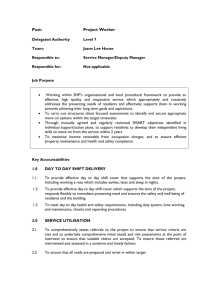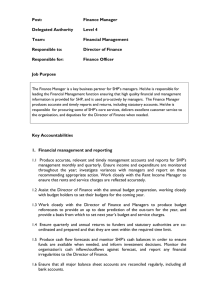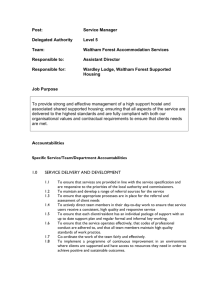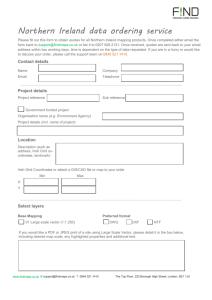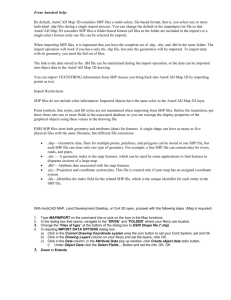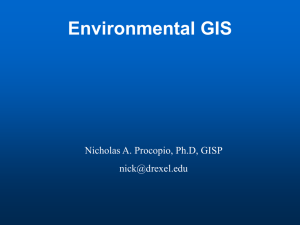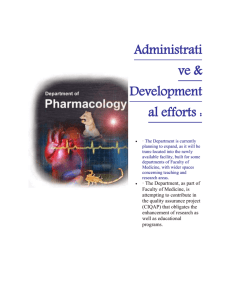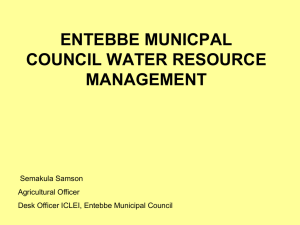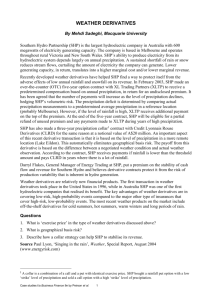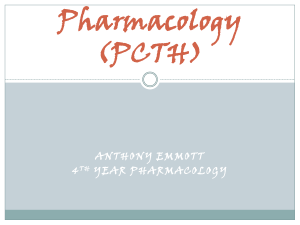RESC 4165 Advanced Cardiac Life Support
advertisement
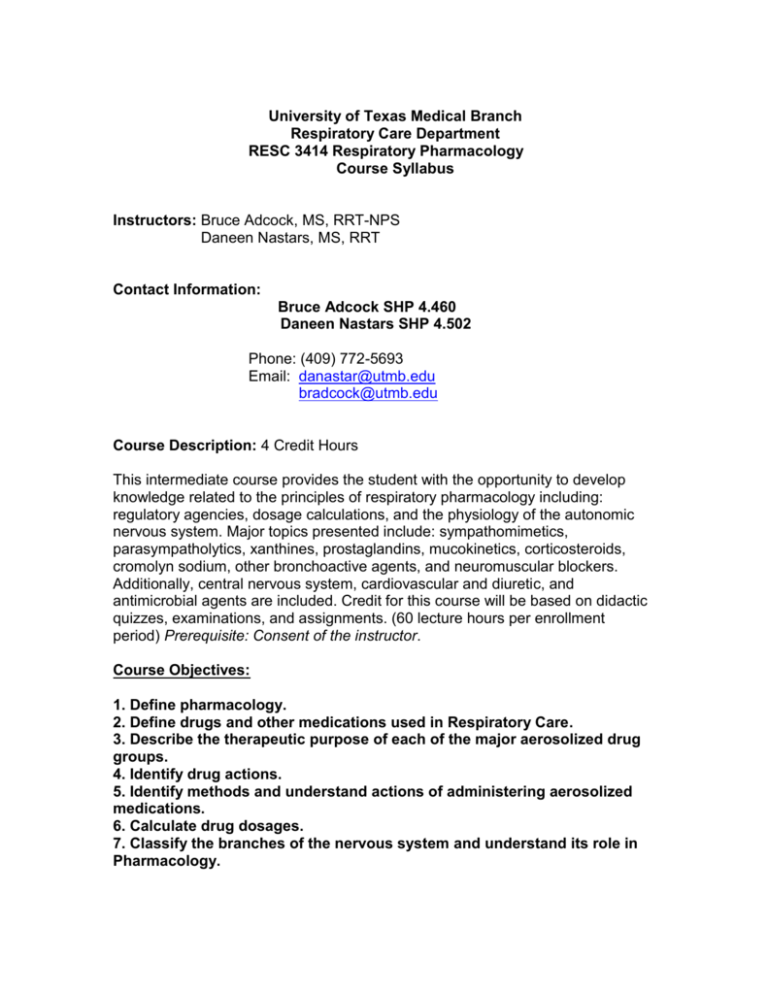
University of Texas Medical Branch Respiratory Care Department RESC 3414 Respiratory Pharmacology Course Syllabus Instructors: Bruce Adcock, MS, RRT-NPS Daneen Nastars, MS, RRT Contact Information: Bruce Adcock SHP 4.460 Daneen Nastars SHP 4.502 Phone: (409) 772-5693 Email: danastar@utmb.edu bradcock@utmb.edu Course Description: 4 Credit Hours This intermediate course provides the student with the opportunity to develop knowledge related to the principles of respiratory pharmacology including: regulatory agencies, dosage calculations, and the physiology of the autonomic nervous system. Major topics presented include: sympathomimetics, parasympatholytics, xanthines, prostaglandins, mucokinetics, corticosteroids, cromolyn sodium, other bronchoactive agents, and neuromuscular blockers. Additionally, central nervous system, cardiovascular and diuretic, and antimicrobial agents are included. Credit for this course will be based on didactic quizzes, examinations, and assignments. (60 lecture hours per enrollment period) Prerequisite: Consent of the instructor. Course Objectives: 1. Define pharmacology. 2. Define drugs and other medications used in Respiratory Care. 3. Describe the therapeutic purpose of each of the major aerosolized drug groups. 4. Identify drug actions. 5. Identify methods and understand actions of administering aerosolized medications. 6. Calculate drug dosages. 7. Classify the branches of the nervous system and understand its role in Pharmacology. Required Course Materials: Gardenhire, D.S., Rau’s Respiratory Care Pharmacology (8th ed), Mosby, Inc., St. Louis, 2012. Supplemental: Gardenhire, D.S., Rau’s Respiratory Care Pharmacology Workbook (8th ed), Mosby, Inc., St. Louis, 2012. Evaluation and feedback on the students' progress will take three forms: 1. 2. 3. Assignments Quizzes Examinations – four exams and a comprehensive final exam will be given Assigning Grades: Quizzes/Assignments 4 Exams Final Exam Total 5% 70% 25% 100% Grade A B C D F %__ 90-100 80-89 70-79 60-69 <60 Course Policies: The minimum passing grade in this course is a 70. Academic Progress: Information regarding the Student's academic progress in this course will be shared with their Academic Advisor and/or Department Chair. Student's making unsatisfactory progress may be referred to the Office of Student Affairs for assistance. . University Statement on Equality, Tolerance and Affirmative Action Please indicate by the end of the 2nd week of the course if you will need accommodations under the Americans with Disabilities Act (Public Law 101-336). If the need for ADA accommodations should arise during the semester you will need to make your request known to the ADA Coordinator in the Office of Student Affairs Academic Integrity Academic dishonesty includes, but is not limited to, cheating, plagiarism, collusion, the submission for credit of any work or materials that are attributable in whole or in part to another person, taking an examination for another person, and any act designed to give unfair advantage to a student or the attempt to commit such an act. Procedures to be followed in the event of alleged academic dishonesty are described the Rules and Regulations of the Board of Regents of The University of Texas System, and the SAHS Student Handbook found at http://www.sahs.edu. Alleged academic dishonesty issues should be reported to the Associate Dean for Student Affairs. All students will maintain academic integrity by avoiding: Copying three words or more in a row without using quotation marks. Paraphrasing work without citing the source of the idea. Copying even one answer on a test (from unapproved notes written anywhere, programmable calculators, watches, phones, cameras, other students, etc.) Doing homework together and failing to note that cooperative effort was used. Letting someone else copy your work or test. Not doing your fair share in group work Using a paper from another class. Purchasing or using a ready made paper or project. Course Evaluations (required): Students will be given the opportunity to evaluate the performance of the instructor and course near the end of the course/semester. When submitting course evaluations students must follow the guidelines provided by the course instructor or department. Respiratory Pharmacology Schedule Fall Week Room Week 1 SHP 1.444 Bruce Week 2 SHP 1.444 Week 3 Daneen Week 4 Library Rm 2.238 SHP 1.444 Week 5 SHP 1.444 Week 6 RB 6 (new Testing Center) rm 1.212 SHP 1.444 Bruce Week 7 Week 8 SHP 1.444 Topic Reading Intro; Unit 1: Principles of Pharm Admin Aerosol Agents Calculating Drug Doses Nervous System Unit 2: Sympathomimetics Exam I Ch. 1 & 2 Ch. 3 Ch. 4 Ch. 5 Ch. 6 Unit 2:Parasympatholytics & Xanthines Mucus-Controlling Therapy Surfactant Agents Corticosteroids Non-Steroidal Anti Asthma Therapy Exam II Ch. 7 Ch. 8 Ch. 9 Ch. 10 Ch. 11 Ch 12 Aersolized Anti-infective Antimicrobials Antimicrobial Agents Cough and Cold Remedies Selected Agents of Pulmonary Value Neonatal and Pedi Aerosolized Drug Therapy Unit 3: Skeletal Muscle Relaxants (Neuromuscular Blockers) Exam III (Chapters 13-18) Ch. 13 Ch. 14 Ch. 15 Ch.16 Ch. 17 Ch.18 Week 9 RB 6 1.212 Week 10 Daneen SHP 1.444 Diuretics Agents Drugs affecting the CNS Ch. 19 Ch. 20 Week 11 SHP 1.444 Ch. 21 Week 12 LRC Testing (Lab 2) 1.808 Vasopressors, Inotropes, and Antiarrhythmic Agents Drugs Affecting Circulation Test IV (Ch. 19-22) NO CLASS – Happy Thanksgiving! Week 13 Week 14 Ch. 22 RB 1.212 Final *This schedule is subject to change Comprehensive

